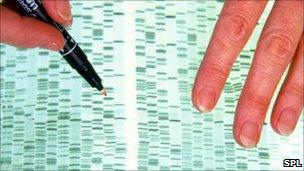DNA profiles to be deleted from police database
- Published

Approximately 5.5 million people's DNA profiles are held
Hundreds of thousands of DNA profiles on the national database will be deleted the government has announced.
Under the proposals, police will no longer be able to retain the DNA profile of most people who are arrested but not subsequently convicted.
At present, the National DNA Database retains the profiles of anyone arrested, irrespective of the outcome.
The changes will bring the law in England, Wales and Northern Ireland into line with Scotland.
Under the measures, set out in the coalition's Protection of Freedoms Bill, any adult convicted of a crime, or child convicted of a serious crime, will still have their DNA profile stored indefinitely in the national database.
But following a critical European Court of Human Rights ruling, there will be wide-ranging changes to when profiles can otherwise be kept.
If an adult is arrested for a serious offence, but not convicted, the profile can be kept for three years with a possible further two-year extension with court approval.
But most of those arrested for less serious offences will see their profile deleted if they are not subsequently charged.
According to the recent figures, there are almost 1.1 million profiles on the database of people without a linked conviction - about a fifth of all those in the system.
Not all of those people will be innocent for various technical reasons, but ministers say that the vast majority of the records will be deleted within months of the legislation being passed.
New watchdog
Police will have the power to retain the DNA samples of anyone arrested for any offence, even if there is no conviction, where the individual is suspected of involvement in terrorism.
The retention of those samples would be initially for three years, with the power to ask a judge to approve two-year extensions.
The government says its will create a new watchdog, the Commissioner for the Retention and Use of Biometric Material, to oversee and possibly reject applications to retain DNA profiles on national security grounds.
Home Office crime prevention minister James Brokenshire said that the policies would ensure that the database was used for the right crime-fighting purposes. "We want to make sure that the guilty are put on it and the innocent are taken off," he said.
But Shadow Home Secretary Yvette Cooper said: "The Government is at risk of putting political rhetoric above the evidence from experts. They are going too far on DNA retention and are going against the evidence that shows it has a significant impact bringing serious criminals to justice and exonerating innocent people."
The changes have been forced upon the government after a damning European Court of Human Rights judgement which said that powers to indefinitely retain DNA records of all those arrested was disproportionate and that the tighter rules in Scotland were fairer.
The former Labour government had already passed legislation to change the system - but the rules had not yet been brought into force.
The system in Northern Ireland is broadly the same as in England and Wales.